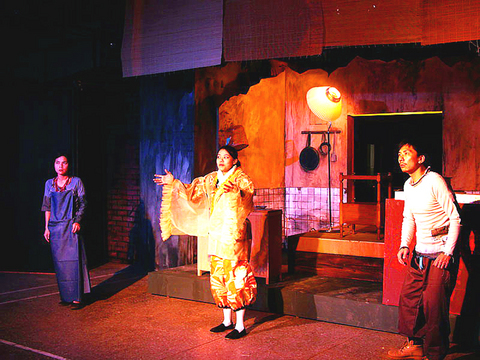From biblical times until the middle of the last century, leprosy was considered one of the most disastrous diseases afflicting humanity. Countless sufferers endured internal exile in lepers' colonies and some were forcibly sterilized.
Leprosy, also known as Hansen's disease after the scientist who in 1878 identified the bacteria that causes the affliction, is curable and not highly contagious. However, discrimination persists into the 21st century.
Taiwanese sufferers of leprosy are currently locked in battle on two fronts.

Construction plans for the Taipei Mass Rapid Transit (MRT) include the demolition of Taiwan's only leprosarium, the 70-year-old Happy Life Lo Sheng Sanatorium (
In the wake of patient protests and petitions, the government is now considering alternative plans.
On a second front, local sufferers of Hansen's disease who were subjected to systematic abuse under Japan's colonial rule over the island have taken their battle for compensation to the courts and won a victory last month when a Japanese judge ruled they were entitled to redress.
Inspired by these struggles, Japanese writer and director Sakurai Daizo penned the play
A harrowing tale of life on the margins of society it is not. At a rehearsal on Tuesday evening, it was evident that
"At a time when nostalgia for Japan's colonial past is on the rise among many Japanese, I wanted to look at the relationship between Taiwan and it's former colonial master," said the playwright who has worked extensively throughout Southeast Asia. "One of the lead characters Oguzi, is both a ghost and a living person who represents how Japan treats Taiwan both economically and politically, today and throughout history."
The ghost Oguzi, a character taken from Japanese folklore, presides over a leprosarium in which the story unfolds. Although no specific reference is made to Happy Life Leprosy Hospital the inference is glaring.
The play dispenses with a linear chronology, frequently switching from the past to the present and back.
After Japan triumphed in the 1905 war with Russia it embarked on a period of imperial expansion. Daizo said his work uses the relationship between nationalism and leprosy at this time to lead the audience to the crux of the play.
"How can we live life in a post-colonial, capitalist society?" Daizo asks.
The group of 12 actors, three of whom are Japanese, came together for this project, but are not part of a formal troupe. Originally scripted as a 2.5-hour play,
The group has invited patients from Happy Life Leprosy Hospital to attend the shows.
Performance notes:
Where: Experimental Theater of the National Theater Hall (
When: Tomorrow at 7:30pm and Sunday at 3pm.
Admission Tickets are NT$400 available through Artsticket. Call (02) 3393 9888 or visit www.artsticket.com.tw/ for more information.

Most heroes are remembered for the battles they fought. Taiwan’s Black Bat Squadron is remembered for flying into Chinese airspace 838 times between 1953 and 1967, and for the 148 men whose sacrifice bought the intelligence that kept Taiwan secure. Two-thirds of the squadron died carrying out missions most people wouldn’t learn about for another 40 years. The squadron lost 15 aircraft and 148 crew members over those 14 years, making it the deadliest unit in Taiwan’s military history by casualty rate. They flew at night, often at low altitudes, straight into some of the most heavily defended airspace in Asia.

Many people in Taiwan first learned about universal basic income (UBI) — the idea that the government should provide regular, no-strings-attached payments to each citizen — in 2019. While seeking the Democratic nomination for the 2020 US presidential election, Andrew Yang, a politician of Taiwanese descent, said that, if elected, he’d institute a UBI of US$1,000 per month to “get the economic boot off of people’s throats, allowing them to lift their heads up, breathe, and get excited for the future.” His campaign petered out, but the concept of UBI hasn’t gone away. Throughout the industrialized world, there are fears that

Like much in the world today, theater has experienced major disruptions over the six years since COVID-19. The pandemic, the war in Ukraine and social media have created a new normal of geopolitical and information uncertainty, and the performing arts are not immune to these effects. “Ten years ago people wanted to come to the theater to engage with important issues, but now the Internet allows them to engage with those issues powerfully and immediately,” said Faith Tan, programming director of the Esplanade in Singapore, speaking last week in Japan. “One reaction to unpredictability has been a renewed emphasis on

Taiwan’s democracy is at risk. Be very alarmed. This is not a drill. The current constitutional crisis progressed slowly, then suddenly. Political tensions, partisan hostility and emotions are all running high right when cool heads and calm negotiation are most needed. Oxford defines brinkmanship as: “The art or practice of pursuing a dangerous policy to the limits of safety before stopping, especially in politics.” It says the term comes from a quote from a 1956 Cold War interview with then-American Secretary of State John Foster Dulles, when he said: ‘The ability to get to the verge without getting into the war is